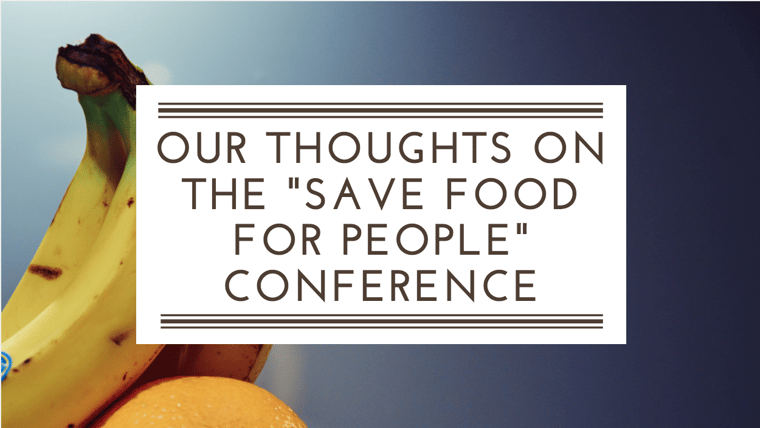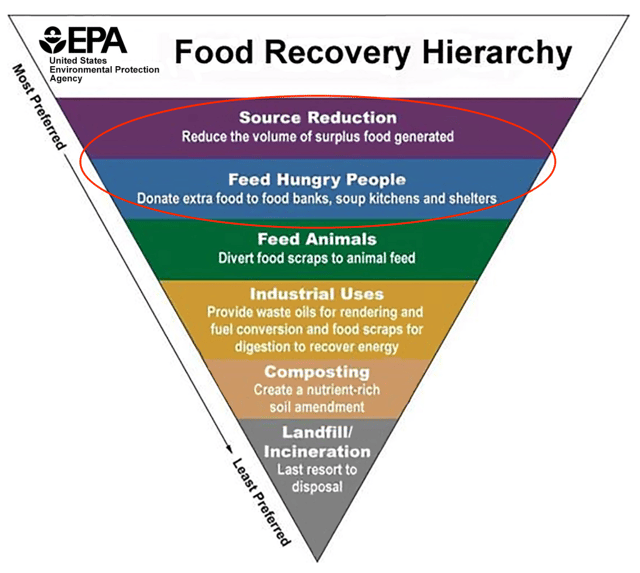
Last month, the Harvard Law School, along with the U.S. EPA, Massachusetts Department of Environmental Protection (MassDEP), and RecyclingWorks Massachusetts, hosted an event called Reduce and Recover: Save Food for People to promote food waste reduction and food recovery.
Nearly 350 attendees from the food waste industry gathered to discuss how to reduce food waste 50 percent by 2030. The event focus on the top two tiers of the Food Recovery Hierarchy: source reduction and feed hungry people.
Watch the recordings from the conference.
 Source: Harvard Food Law and Policy Clinic
Source: Harvard Food Law and Policy Clinic
3 Key Observations from the Save Food for People Conference
Our team had the opportunity to attend the full three-day conference. We were beyond thrilled that this event was taking place to bring together food waste innovators from across the country and internationally to advance a very important discussion around what has now become its very own industry. But we were even more proud that this convening was taking place in our backyard in Cambridge, Massachusetts.
The conference brought together many old friends we’ve worked with since the very beginning of Spoiler Alert, as well as enabled us to create new relationships with organizations and individuals who have inspired us from afar. We were especially excited to see Spoiler Alert users involved, such as Ashley Street Teaching Kitchen, Lovin' Spoonfuls, Daily Table, Food for Free, and Food Link. A month later, here are some of our reflections.
1. For profit and nonprofit entrepreneurs needed — coast-to-coast.
We were thrilled to be surrounded by peers and partners tackling America’s waste problem, particularly during the entrepreneurship-oriented first day of the conference. This included friends at Imperfect Produce, Food Donation Connection, Misfit Juicery, Hungry Harvest, and many others bringing a fresh spin on innovation. The energy was infectious and a great reminder of how continuous collaboration between for-profit startups and nonprofit initiatives is needed.
Big love to @misfitjuicery, an amazing start up using ugly produce to make delicious juice! #SaveFood4People @dcck pic.twitter.com/srKbgMua0g
— Amy Bachman (@amybachs) June 28, 2016
Additionally, the conference highlighted the need for innovation around business and revenue models. We particularly enjoyed the discussions around value-added processing (including the work being done by Baldor Foods, Commonwealth Kitchen, Philabundance, and Food Shift), the push for food rescue organizations to be better compensated for their great work (similar to other transportation and waste service providers), as well as thinking through innovative ways to engage the transportation industry in food recovery to make use of empty trucks on long and short backhauls.
2. Practice what we preach.
Almost all of the food at the conference was “recovered” - meaning it came from sources where it otherwise would have gone to waste. This equaled about 1,000 meals fed to nearly 350 attendees, driven in large part by the efforts of Sustainable America. Spoiler Alert helped source breakfast items from Boston Organics, Daily Table, and Iggy’s Bread.
Thanks @MySpoilerAlert for helping to recover food that would be wasted but instead it's our breakfast!@HarvardFLPC pic.twitter.com/qGtKCghwaV
— Christy Cook (@cdcook3) June 29, 2016
How to Feed 350 #FoodWaste Experts https://t.co/XLtocVWpye #savefood4people @HarvardFLPC @MySpoilerAlert @broademily pic.twitter.com/W8TW3Ic0dT
— Sustainable America (@foodfuelfuture) July 18, 2016
This initiative was beyond appropriate for the audience - which included Tristram Stuart, architect of the Feeding the 5000 movement. We are hopeful this will serve as a source of creativity and inspiration for pulling off similar initiatives — in large-scale format or at home.
3. More industry representation needed.
In order for the energy of these types of conferences to be translated into action, more stakeholders from the food industry and America’s leading food corporations will need to be engaged in the future. We were thrilled to see attendance from some great companies - including Baldor Foods, Bon Appetit, Whole Foods, BJ’s Wholesale, Panera, Hannaford - and are eager to see representatives from other leading manufacturers, distributors, and retailers at next year’s conference.
Our own Thomas McQuillan talks reducing and recovering food waste at @HarvardFLPC #SaveFood4People. #endfoodwaste pic.twitter.com/imWx1vfeK5
— Baldor (@BaldorFood) June 29, 2016
Post-Conference Coverage
Following the conference, the Huffington Post launched their “Reclaim” campaign, a series on food waste and its impact.
For more coverage, see these articles:
- “Save Food for People”: Hundreds gather at Harvard to discuss urgent need for food waste reduction | Waste Dive
- How to feed 350 food waste experts | Sustainable America Blog
A big thank you to Emily Broad Leib and her team at the Harvard Food Law and Policy Clinic and RecyclingWorks Massachusetts for allowing us to be part of the dialogue.
.png?width=250&name=SpoilerAlert_WhiteLogo_LeftStacked%20(7).png)